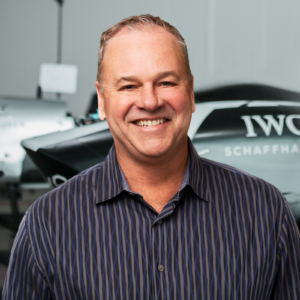At the end of August, Airspeeder, a leader in flying car racing technology, welcomed Gary Gysin to the board of directors. But how did the company entice the former Wisk CEO out of retirement?
“When I left Wisk and announced my semi-retirement [in February 2023], I knew it wouldn’t be a full unplugged type of deal because that just isn’t how I’m wired,” Gysin told FINN’s aerospace editor Hazel King. “I knew I wanted to do board positions and consulting for companies so that’s what I’m doing. I’m fortunate to be able to pick companies that I want to work with, and Jack [Withinshaw, Airspeeder co-founder] and I met long ago on a bus ride to a conference. I had no idea what he was talking about when we first met – he said, ‘We’re doing Formula 1 in the sky’, and I thought what in the world is that?
“But we formed a friendship over the years and stayed in touch. When I retired, Matt [Pearson, Airspeeder co-founder] and Jack approached me and asked what I thought about joining the board – I thought it would be awesome,” he added.
 The race towards safety
The race towards safety
Debuted in December 2017 and taking its inspiration from the Formula E car racing series established in September 2014, Airspeeder was created by Australian start-up Alauda Aeronautics. It brings together cutting-edge technology, high-performance electric aircraft, and thrilling racing experiences to accelerate the development of eVTOL technology and inspire the next generation of aviators and engineers.
“I think what Airspeeder is doing is similar to the automobile evolution in terms of safety and innovation,” Gysin explained. “When you race, you uncover things that are probably ahead of the game, certainly from a safety perspective. When you see an accident in motorsport, 20 years ago someone would have died but today, for the most part, they walk away, so the safety that has occurred in motorsport is just incredible.
“When you are out in the real world testing the technology to extremes, you’re pushing the envelope of the vehicle and the technology, and so adaptation and learning from that will occur,” Gysin continued. “Safety innovation will occur too because it just has to, and that will help the overall industry. It is always about proving a safety track record and giving confidence to the aviation authorities. Flying is the safest form of transportation and piloted eVTOL will be even safer, and then autonomous will be safer still. It is all about confidence building. Any time you can push technology and make it more performance enhancing, it is going to help the overall market.”
The path to certification
Airspeeder can conduct its racing under an experimental certification, rather than the full certification required for commercial eVTOL operators before they can operate, which means it is able to push boundaries.
“The hard part about anyone in the eVTOL space is the certification process is going to take forever. And so, you can race at the leading edge, learn things, innovate technically and from a safety perspective, advance the whole eVTOL space faster than perhaps doing it the traditional way. Plus, it is exciting and fun,” Gysin enthused.
The eVTOL market has seen an explosion of interest in recent years, and by 2030 passenger advanced air mobility operators could rival today’s largest airlines in flights per day and fleet size, according to McKinsey and Company. However, certification is a “hard process” according to Gysin, especially for those operators looking to go straight to fully autonomous flight.
“I think it’s the right path to go for full autonomy because that is where the market is going to go, that is where it will scale, and companies will make money. But having said that, it is a hard journey. Could FAA or EASA move faster? Absolutely. Could they have more of a roadmap to get to autonomy? Yes, absolutely. But this a new world of autonomous operation and it will take time,” he added.
Continuous evolution
So, how will a flying motorsport series help develop a commercial eVTOL sector for the everyday user? “Motorsport is exciting, and one of the biggest things it will do is bring awareness to this whole segment,” explained Gysin. “If you see a vehicle race safely and at the leading edge of technology, you might be more likely to hop in an air taxi or not worry about the cargo travelling autonomously in the air above you. Racing brings incredible awareness and excitement for the whole sector.”
And like the motorsport world – where the vehicle that begins the season isn’t the same as the vehicle that ends it – Airspeeder is seeing rapid development of flying car technology that will filter down to the wider eVTOL market.
“The blistering pace that motorsport goes through because the competition to win is incredible, and the technologies that have arrived because of that are amazing. You have an industry that thrives on rapid iteration, rapid technology development and these are the things that typically motorsport is known for. So, if you have that type of environment with aerospace technology combined with enthusiasts and craftsmen coming together with that kind of pace, it going to be amazing,” Gysin added.
Forward thinking
By taking its inspiration from those that have gone before it, Airspeeder will evolve the next generation of aircraft and continue to move the industry forward. So where does Gysin see things heading over the next 75 years?
“The aviation and automobile sectors are going to change dramatically with things like ride sharing. You won’t need to own your own private eVTOL vehicle, but instead they will be available on demand,” he said.
“Then, with companies like Boom, we’ll have the evolution of supersonic travel. I don’t know if the economics work out – we’ll see how that plays out. It would be amazing if that does happen because who wants to be travelling to a destination? We just want to get to it.
“And finally, space travel – that will definitely be a more common thing in 75 years, and not just a rich man’s game. That will be pretty exciting,” he concluded.
This interview was conducted as part of the 75th anniversary celebrations for Farnborough International Airshow. FINN is owned by Farnborough International, the organisers of the airshow.

